- News
- Reviews
- Bikes
- Accessories
- Accessories - misc
- Computer mounts
- Bags
- Bar ends
- Bike bags & cases
- Bottle cages
- Bottles
- Cameras
- Car racks
- Child seats
- Computers
- Glasses
- GPS units
- Helmets
- Lights - front
- Lights - rear
- Lights - sets
- Locks
- Mirrors
- Mudguards
- Racks
- Pumps & CO2 inflators
- Puncture kits
- Reflectives
- Smart watches
- Stands and racks
- Trailers
- Clothing
- Components
- Bar tape & grips
- Bottom brackets
- Brake & gear cables
- Brake & STI levers
- Brake pads & spares
- Brakes
- Cassettes & freewheels
- Chains
- Chainsets & chainrings
- Derailleurs - front
- Derailleurs - rear
- Forks
- Gear levers & shifters
- Groupsets
- Handlebars & extensions
- Headsets
- Hubs
- Inner tubes
- Pedals
- Quick releases & skewers
- Saddles
- Seatposts
- Stems
- Wheels
- Tyres
- Health, fitness and nutrition
- Tools and workshop
- Miscellaneous
- Tubeless valves
- Buyers Guides
- Features
- Forum
- Recommends
- Podcast
review
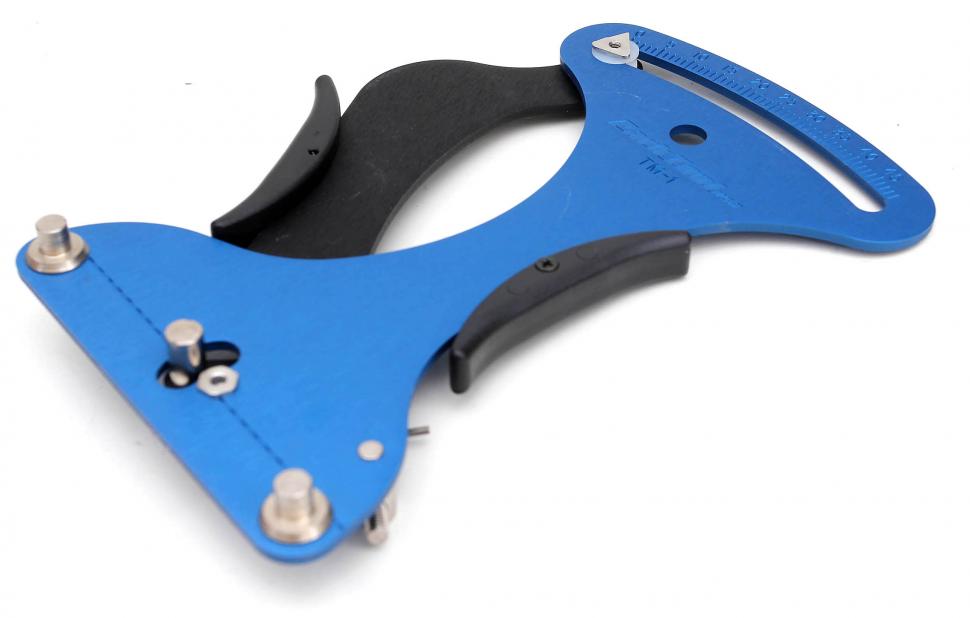 Park Tool TM1 spoke tension gauge
Park Tool TM1 spoke tension gauge£64.99
VERDICT:
Worthwhile companion to your truing jig if you like building your own hoops
Weight:
225g
Contact:
www.madison.co.uk
At road.cc every product is thoroughly tested for as long as it takes to get a proper insight into how well it works. Our reviewers are experienced cyclists that we trust to be objective. While we strive to ensure that opinions expressed are backed up by facts, reviews are by their nature an informed opinion, not a definitive verdict. We don't intentionally try to break anything (except locks) but we do try to look for weak points in any design. The overall score is not just an average of the other scores: it reflects both a product's function and value – with value determined by how a product compares with items of similar spec, quality, and price.
What the road.cc scores meanGood scores are more common than bad, because fortunately good products are more common than bad.
- Exceptional
- Excellent
- Very Good
- Good
- Quite good
- Average
- Not so good
- Poor
- Bad
- Appalling
If you get into building wheels and you're anything like me, you'll probably do the first couple in your bike frame with allen keys blu-tacked to the fork blades as primitive gauges. Form there it's a leap into the buying of a jig of some sort, and once you're at that point the next thing on your list should be a spoke tension gauge, like this one from Park.
The TM1 measures spoke tension by loading up the spoke between two static pins, with a third, sprung pin pressing down on the spoke and giving a readout. This is just a number from zero to 50; if you want to know the actual spoke tension there's a chart which maps that number to actual tension in different sorts of spoke. You get a circular measuring tool thrown in so you know what diameter of spoke you have.
Once you've had a look at your chart to see the acceptable range of numbers for a certain kind of spoke, you can set to work on your wheel. The TM1 is a valuable tool because it allows you to easily get the spoke tension even all the way round the wheel. Once the spokes are roughly tight and the rim central, it's a case of going round the wheel one spoke at a time and making sure that all the spokes on each side of the wheel have the same tension.
Obviously different dishing and spoke patterns can mean that the tension is quite different from one side to another, but if you can equalise spoke tension around the wheel then you'll invariably end up with a wheel that's more or less true, especially in the vertical plane where errors are more difficult to correct. Once you're happy with both the amount of tension and the fact that it's even, you can make the (normally minor) adjustments necessary to get the wheel perfectly in line.
Using the TM1 is simple: just clamp it on to the spoke and read the number. There's a couple of places to trap your fingers but you soon learn where they are, and to avoid them. If you fiddle around with the indicator when the gauge is in position it's possible to move it through quite a range, which made me worry a bit that it wasn't going to give repeatable results. But clamping a spoke and taking the first number the TM1 settles on does give a very consistent reading, plus or minus about 0.5 on the gauge. It's quick to use too, you can work round a wheel in no time and be confident that you haven't left any loose spokes.
It's not cheap at over £60, but it's less than the price of a new rim and spokes if your wheel falls apart, so if you're planning on building more than a few wheels it's a worthwhile addition to your workshop.
Verdict
Worthwhile companion to your truing jig if you like building your own hoops
road.cc test report
Make and model: Park Tool TM1 Spoke Tension Gague
Size tested: Blue/Black
Tell us what the product is for, and who it's aimed at. What do the manufacturers say about it? How does that compare to your own feelings about it?
They say: The TM-1 Tension Meter accurately and reliably measures the absolute tension of each of the spokes in a wheel, as well as the relative tension between all the spokes in a wheel. Easy to use and priced affordably, the TM-1 works on nearly any bicycle spokeno matter what the diameter, material, or shape. The TM-1 is for anyone building or truing wheels, diagnosing wheel problems, or assembling new bikes. It's a tool that belongs on every workbench."
We say: yeah, pretty much what they said. Except for the bit about everyone needing one.
Rate the product for quality of construction:
7/10
It's a fairly basic tool but it's solidly made
Rate the product for performance:
8/10
Gives simple repeatable spoke tension readings
Rate the product for durability:
9/10
It's solid enough to last and rebuildable
Rate the product for comfort, if applicable:
6/10
There's a couple of places to trap your fingers but you soon learn where they are
Rate the product for value:
6/10
Fairly expensive but it's a specialist tool
Tell us how the product performed overall when used for its designed purpose
Well
Tell us what you particularly liked about the product
Simple to use, repeatable results
Did you enjoy using the product? Yes
Would you consider buying the product? Yes
Would you recommend the product to a friend? Yes
About the tester
Age: 38 Height: 190cm Weight: 98kg
I usually ride: whatever I'm testing... My best bike is: Genesis Equilibrium with SRAM Apex
I've been riding for: 10-20 years I ride: Every day I would class myself as: Experienced
I regularly do the following types of riding: time trialling, cyclo cross, commuting, sportives, general fitness riding, fixed/singlespeed, mtb, Mountain Bike Bog Snorkelling, track
Dave is a founding father of road.cc, having previously worked on Cycling Plus and What Mountain Bike magazines back in the day. He also writes about e-bikes for our sister publication ebiketips. He's won three mountain bike bog snorkelling World Championships, and races at the back of the third cats.
Latest Comments
- antigee 4 hours 40 min ago
...."To the public and to all intents and purposes, e-bikes and those bikes which do not conform to EAPC regulations are indistinguishable: two...
- ErnieC 5 hours 19 min ago
I am not so sure about and have a feeling they would still be trying for the total destruction of Israel even if they had their own state.
- Simon E 6 hours 21 min ago
Since when have BC cared about their members' opinions? I agree with the sentiment but I suspect that it would be a complete waste of my time....
- Aluminium can 6 hours 21 min ago
No AI face recognition or data mining is required. The technology that best reduces theft is: a locked door. Look at the top photo in the article...
- Miller 6 hours 45 min ago
Also Nextie who offer a selection of carbon rims in very modern designs and which are very well made.
- chrisonabike 7 hours 13 min ago
Perhaps they should offer to become a US state? If they're building lots more car infra, they're showing willing at least. They just need to...
- ragtag 7 hours 23 min ago
The company that make MAAP kit was based in Denmark. They made the top you mention. It is a bit contrived, but not entirely.
- Mr Blackbird 7 hours 55 min ago
Re Tom De Moulin's half marathon. It isn't a blistering time, but it is a good time. It is at the level of an elite club runner, who would finish...
- alchemilla 8 hours 47 min ago
Never understood why a cyclist would stop when they see a warden approaching. Just keep going....
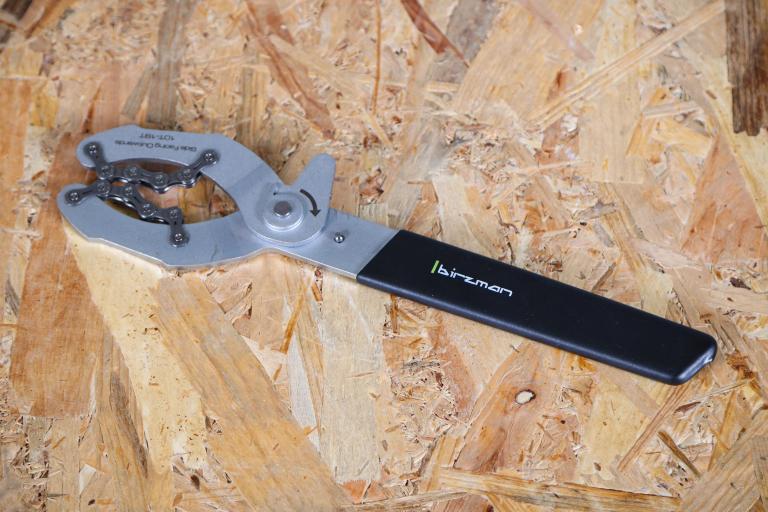
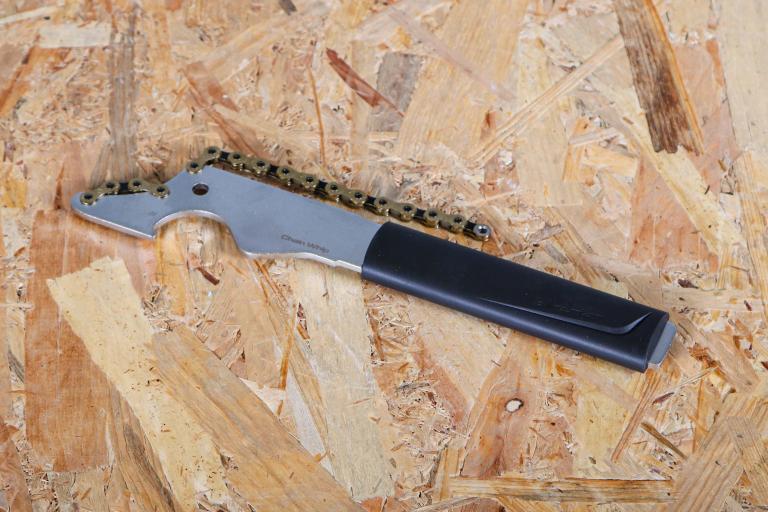
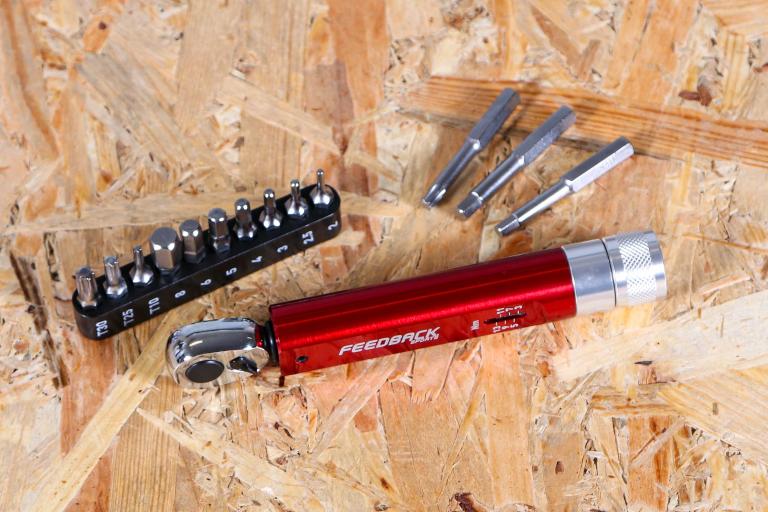
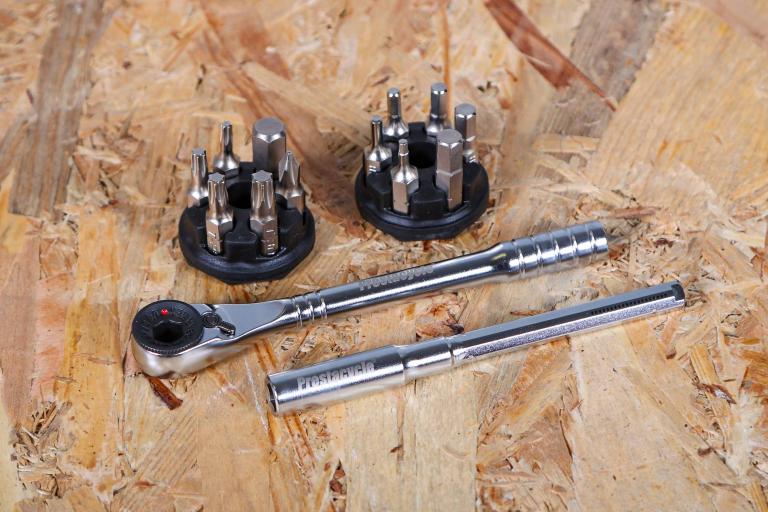
Add new comment
4 comments
A tension meter was my first purchase and greatly reduced the amount of time it takes me to get a wheel together and "there or thereabouts".
I still true in a frame, turned upside down, on the living room carpet (sorry Gem). I open the brake calipers right up and insert the wheel, then close them until I can hear the first signs of the block rubbing on the rim. I remove the biggest deflection from the rim, then close the calipers slightly and repeat. Since the brake calipers were centred using a known-good wheel, I haven't found a need for a dishing tool. This method has worked for me for three wheel builds now.
Fifty-odd quid (the TM-1 online price) still seems quite pricey for a bit of metal sheet, a spring and some plastic bits though!
I'd say a dishing tool would be before a tensionometer.
i used a piano when i built mine. somewhere on the web (mostly likely chez SB) it said what note you should be aiming for
in fairness, I think this tool is a bit cheaper.
A tuning fork would be a lot smaller and cheaper than that!
However, I've read that rear wheels normally have different tension and lacing on drive vs non-drive side, so you'd need two tuning forks. And different spoke+rim combinations shouldn't necessarily all be tuned to the same pitch or frequency.
One wheelbuilder will sell you a PDF so you can build your own.